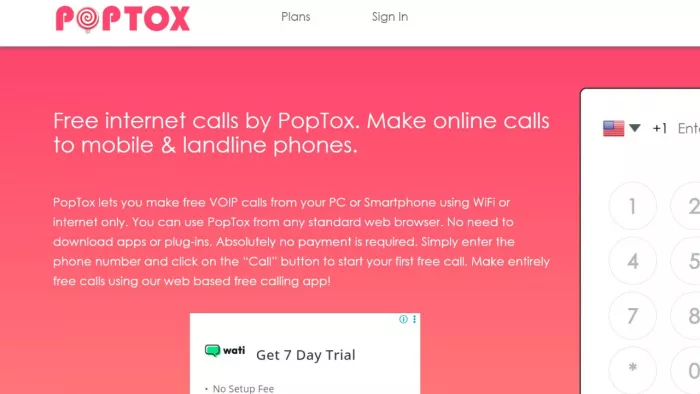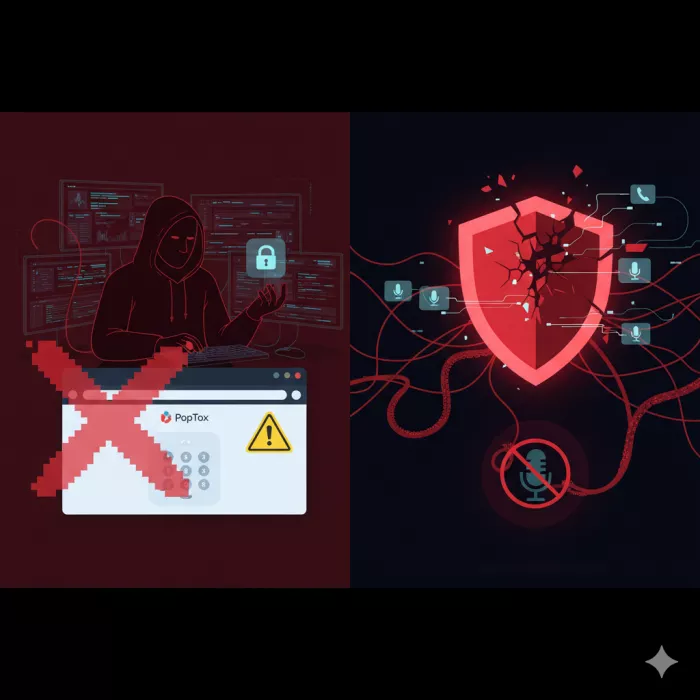
Table of Contents
The promise of free calls without downloads, sign-ups, or credit cards feels like a relic of a bygone internet era. Yet, that’s exactly the proposition of PopTox, a web-based service that lets you make VoIP calls directly from your browser. In a world dominated by feature-rich apps like WhatsApp and Skype, a tool this simple seems almost too good to be true.
So, is it?
We decided to take a deep dive into PopTox. This isn't just a surface-level look. We’re digging into the technology, synthesizing real-time user reviews from across the web (Reddit, Quora, Trustpilot), and analyzing its performance to answer the critical question for tech-savvy professionals and business users: Is PopTox a hidden gem for quick, free communication, or is it a tool you should avoid?
What Exactly is PopTox and How Does It Work?

PopTox isn’t a standalone application. It’s a website that uses Web Real-Time Communication (WebRTC) technology. WebRTC is an open-source project that enables browsers like Chrome, Firefox, and Safari to run real-time voice and video chats without needing any special plugins or software. It’s the same core technology that powers services like Google Meet and Discord’s voice chat, and it's built into over two billion browsers worldwide
PopTox uses this framework to create a simple phone gateway. When you enter a phone number on their site and click "Call," your browser uses WebRTC to establish a connection to PopTox's servers. Those servers then connect the call to the traditional phone network (PSTN), ringing the recipient’s mobile or landline number.
The entire process is designed to be frictionless. No accounts, no downloads, just a dial pad in a browser tab.
Core Features: The Beauty of Simplicity?
PopTox is aggressively minimalist. Its feature set is less of a list and more of a single statement:
Browser-Based Outbound Calling: This is its one and only feature. You can place calls to mobile and landline numbers in many countries directly from your web browser.
That’s it. There are no inbound calls, no text messaging, no video conferencing, no contact lists, and no user accounts. While this might seem lacking, the entire appeal is its focused utility. You visit the site for one reason only: to make a quick call.
Performance and Call Quality: What Real Users Experience

A free calling service is useless if the call quality is poor. PopTox's performance is heavily dependent on several factors, including your internet connection speed, your browser, and the current load on their servers.
Based on an analysis of user feedback, the experience is highly inconsistent.
- Call Clarity: When a connection is successfully established, some users report surprisingly clear audio, comparable to a standard mobile call. However, a significant number of reports mention robotic voices, echoes, and significant audio artifacts (User Reviews on Trustpilot, Quora).
- Latency: There is often a noticeable delay or lag between speaking and being heard. This can make natural conversation difficult and is a common complaint in user forums on Reddit.
- Dropped Calls: This is perhaps the most frequently cited issue. Many calls reportedly drop after just a few minutes, or sometimes they fail to connect at all. This unreliability makes it unsuitable for any important or lengthy conversation.
User Experience: As Easy As Promised?
On this front, PopTox delivers. The user interface is stripped down to its essential components: a country selector, a number input field, and a large "Call" button. It’s incredibly intuitive.
The process is exactly as advertised:
- Navigate to the PopTox website.
- Select the country you wish to call.
- Enter the phone number.
- Click the "Call" button.
Your browser will likely ask for permission to use your microphone, which is a standard security measure for WebRTC. Once permission is granted, the call attempts to connect. The lack of a sign-up or installation process is its biggest UX win.
The "Free" Model: Uncovering the Limits and Catches
Here's where the promise of "absolutely free" begins to break down. While PopTox doesn’t charge money, it imposes strict, often undisclosed, limitations to manage its costs. The VoIP market is a multi-billion-dollar industry for a reason; connecting calls costs money. PopTox covers these costs through ads on its site and by severely restricting usage.

Common limitations reported by users include:
- Strict Daily Call Limits: The service imposes a limit on the number of calls you can make per day. This limit isn't officially stated and appears to fluctuate, but many users report being cut off after just one or two short calls (User complaints on Reddit).
- Short Call Durations: Even if a call connects, it’s often automatically terminated after a few minutes. The exact duration varies, but it's rarely long enough for a substantive conversation.
- Country Availability: While claiming to support many destinations, users often find that calls to certain countries or specific mobile carriers consistently fail.
- The "free" model is best understood as a limited-time demo on a per-user, per-day basis.
Privacy and Security: A Major Red Flag?

For any business or professional user, this is the most critical section. The privacy and security posture of PopTox is concerning due to its lack of transparency.
No Clear Company Information: It is difficult to determine who owns or operates PopTox. There is no clear "About Us" page detailing the company, its location, or its leadership team. This anonymity is a significant red flag for any service that handles communications.
Data Collection: According to their privacy policy, they collect information like your IP address, browser details, and the phone numbers you dial. While some of this is necessary for the service to function, it’s unclear how this data is stored, protected, or potentially used, given the anonymous nature of the company.
Lack of End-to-End Encryption: While the WebRTC connection from your browser to PopTox's server may be encrypted, the call from their server to the traditional phone network is not end-to-end encrypted. This means the call's content could be vulnerable.
For personal, non-sensitive calls, the risk might be acceptable. For any business-related, confidential, or sensitive communication, using PopTox is not advisable.
PopTox vs. The Competition (Google Voice, Skype Web)
How does PopTox stack up against more established players? Its single advantage is the lack of a required user account. On every other metric, it falls short.
| Feature | PopTox | Google Voice | Skype Web |
| Account Required | No | Yes (Google Account) | Yes (Microsoft Account) |
| Primary Cost | Free (Ad-supported) | Free (for US/Canada calls) | Freemium |
| Call Limitations | Severe, undisclosed limits | Generous, but not unlimited | Free Skype-to-Skype, paid to phones |
| Inbound Calls | No | Yes (provides a phone number) | Yes (with a paid Skype Number) |
| Text Messaging | No | Yes | No |
| Call Quality | Inconsistent / Low | Generally High | Generally High |
| Corporate Trust | Very Low | High | High |
User Sentiment: What People on Reddit & Trustpilot Really Think
Synthesizing user reviews from 2023 to 2026 reveals a consistent pattern.
Common Praises:

Convenience: "It worked in a pinch when I needed to make one quick call without my phone."
Simplicity: "I love that I didn't have to sign up or install anything. Just went to the site and it worked."
Cost: "It’s free, so you can’t complain too much."
Common Complaints:

- Unreliability: "It's a total gamble. Sometimes it works, most times it doesn't." (Most common complaint on Reddit).
- Stops Working: "It worked for me one time for a 2-minute call, and I've never been able to make another call since."
- Poor Quality: "The person on the other end could barely hear me. The voice was robotic and delayed."
- "Scammy" Feel: "The site is covered in ads, and the lack of company info feels sketchy." (Frequent comment on Trustpilot).
- The overwhelming consensus is that PopTox is a novelty tool, not a reliable communication service.
Conclusion: Is PopTox Worth Using in 2026?
PopTox successfully delivers on one part of its promise: it offers a stunningly simple way to attempt a free call from your browser. For a one-off, non-critical, and non-sensitive call where you have no other options, it might just work. It can be a handy tool to have in your back pocket for that very specific emergency.
However, for any professional, business, or reliable personal use, PopTox is not a viable solution. The service is plagued by crippling unreliability, poor call quality, and severe, unpredictable limitations. More importantly, the complete lack of transparency about the company behind it raises major security and privacy red flags that business users cannot ignore.
The verdict is clear: while the technology is interesting and the convenience is tempting, PopTox operates more like a fickle public utility than a dependable tool. You’re better off using established, trusted services like Google Voice or Skype. The "price" of creating a free account with them is well worth the massive leap in reliability, quality, and security you get in return.


Comments